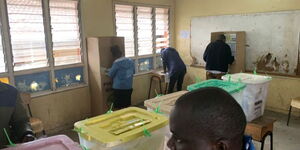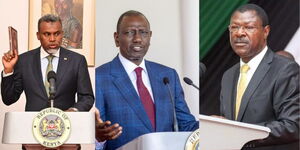A new Bill, the Constitution of Kenya (Amendment) Bill, 2025, that seeks to create special seats in both the National Assembly and Senate, is in the pipeline.
In the Bill, sponsored by Uasin Gishu Woman Representative Gladys Shollei, Dagoretti North MP Beatrice Elachi, and Laikipia Woman Representative Jane Kagiri, the seats will be allocated to political parties after an election to give effect to the two-thirds gender rule.
As it is a Money Bill, it will trigger occasional public expenditure, with the seats will be allocated proportionately to the number of seats won by the party.
“The principal object of this Bill is to amend the Constitution to ensure that the membership of the National Assembly and the Senate conforms to the two-thirds gender principle provided for in Article 81(b) of the Constitution,” it read in part.
“The Bill seeks to give effect to the two-thirds gender principle through the creation of special seats that will ensure that the gender principle is realized in Parliament,” it added.
In the Bill, the Independent Electoral and Boundaries Commission (IEBC) will play a key role as it shall ensure that each political party participating in a general election nominates and submits a list of all the persons who would stand elected if the party were to be entitled to all the seats as provided in the Bill.
Also, it shall ensure that each party's list comprises the appropriate number of qualified candidates and alternates between male and female candidates in the priority order in which they are listed.
The IEBC shall also, except in the case of county assembly seats, ensure that each party’s list reflects the regional and ethnic diversity of the people of Kenya.
This Bill does not delegate legislative powers, meaning that it does not give the authority to make new laws or regulations to any other person, body, or organization. Instead, the Bill's purpose is simply to amend the Constitution directly, which is a function of the National Assembly.
It would require passage in both houses of Parliament, as enshrined in Article 256 of the Constitution. However, it would require support by not less than two-thirds of members in both houses to pass.
If passed, the special seats will last for 25 years, with a possibility for a ten-year extension. According to the Bill, it is expected that by its lapse, enormous gains will have been made with regard to gender parity in elected members of Parliament.
Currently, the National Assembly has 349 members, plus the Speaker, who is an ex officio member. It is comprised of 249 MPs elected from single-member constituencies, 47 women representatives elected from each county, and 12 members nominated by political parties to represent special interests, including youth, persons with disabilities, and workers.
The Senate has 67 members, plus the Speaker, who is an ex officio member. Out of this, 47 Senators are elected and represent the 47 counties, 16 women nominated by political parties to ensure a gender balance, 2 members (one man and one woman) representing the youth, and 2 members (one man and one woman) representing persons with disabilities.












